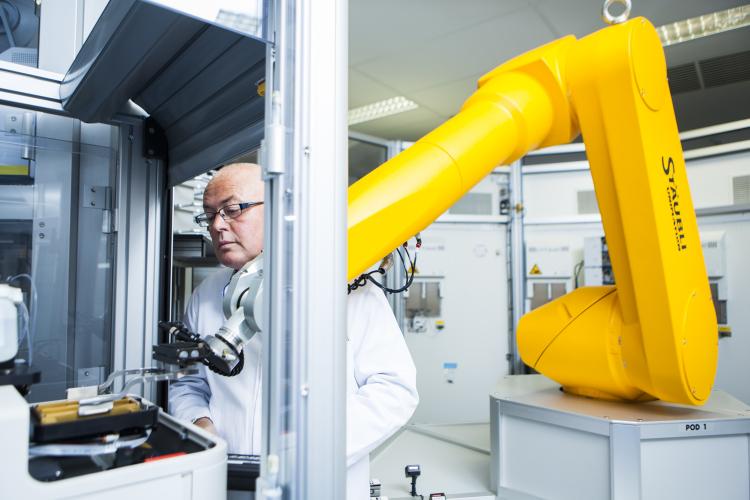SMEs don’t have to join our projects to benefit from them. Here are some of the indirect ways IMI is supporting Europe’s smaller enterprises

Boosting the competitiveness of European SMEs is part of IMI’s mission, and directly channelling funding to SMEs through our research projects is the principal way this is achieved. However, since the beginning, the programme has been able to support non-project SMEs in other, indirect ways. Here are some examples:
Drug discovery starting points: ELF/ESCulab
Through the European Lead Factory (the ELF/ ESCulab), IMI has brought together high-quality chemical compounds from multiple pharma companies into a single screening collection. SMEs in the early stages of drug development can screen this vast library to identify compounds that show an effect on a given biological ‘target’. It’s been a lifeline for small biotech firms with promising targets, such as Metabomed, an Israeli biotech SME whose drug discovery efforts target metabolic pathways involved in the growth of different types of cancer.
Each of Metabomed’s projects is focussed on a specific protein, and to find molecules that inhibit the activity of these proteins, they need to be able to screen vast numbers of compounds. According to Dr Omri Erez, the company’s Vice-President of Biology, they have been able to use the ELF/ESCulab library and screening capabilities in the first step of three of their drug discovery projects, one of which is about to be submitted for authorisation to proceed to a clinical trial.
“This is a something that a small company cannot justify having in-house, not just the chemical library but also the high-throughput screening (HTS) capabilities.”
“When we are considering this initial step of hit discovery, there are two main issues: the first is the scale of the chemical compound library. The second aspect is the quality of the library. This is where the ELF comes in and gives a huge, huge advantage for a company like us.”
Dr Erez says that as Metabomed works with targets that have not been explored before, the size and diversity of the ELF/ESCulab collection is particularly important. “These are often ‘first-in-class’ targets with unknown chemical preferences. These projects have a higher risk of failure to identify inhibitors, and most of Metabomed’s projects fall under this category. This risk is reduced when you screen large, high-quality, high-diversity libraries that allow you the best chance of identifying hits. This is crucial - If the initial hits are good, your project gets off to a good start.”
Training, standardisation for big health data: EHDEN
With the rise in dependence of big health data in the biomedical sector, standards that harmonise how data are collected, stored and analysed are becoming increasingly important. Healthcare data is typically held in disparate databases, each with their own formatting and encoding rules. On average, a researcher will spend 80% of their time finding and standardising data and only 20% generating insights to inform patient care or future research. A more efficient process is to standardise all databases to a common data model, allowing researchers to concentrate on the actual research. However, this standardisation process is technically challenging and can be expensive.
Thanks to the EHDEN project, there is now a whole new generation of small companies around Europe that have been trained and officially certified for the task of mapping observational data to the OMOP common data model. Custodians of data – whether it comes from hospitals, registries, or population data – can receive support from the EHDEN project to hire these SMEs to help them standardise their data. So far, 26 SMEs have been certified with more in the pipeline. The EHDEN certification has helped these SMEs expand their existing market, and become early adopters in a new data management ecosystem, giving them a competitive advantage and a specialised skill set.
Bringing tech developers into clinical research: Trials@Home
Advances in digital technology have opened up new opportunities for tech companies to get involved in clinical research, particularly in the area of remote decentralised clinical trials (RDCTs). These are clinical trials where the treatment and testing come to the patient (at home, at work or a local clinic) rather than the patient having to travel to a centralised facility. These trials help overcome some of the problems of participant recruitment and retention, efficiency and cost inherent in traditional clinical trials. The IMI project Trials@Home has been experimenting with ways to make RDCTs a success, using technologies like apps, smartphones and sensors.
The consortium is launching a call for companies with existing technologies that could be used in remote decentralised clinical trials (the project recently conducted a ‘scan’ – a request for information on the technology that’s out there). The technologies sought will cover the all stages of clinical trials, from trial setup and recruitment through close-out and reporting. The call will launch on 16 November 2020.
Read more
The biomedical sector is full of giants, but it’s the start-ups that connect the dots
Small firms can see big gains from joining forces with pharma
